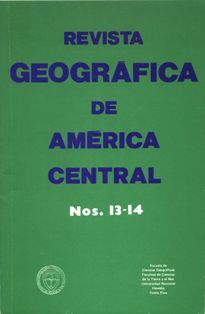ROL DEL DESARROLLO MUNICIPAL EN UNA ESTRATEGIA DE DESCENTRALIZACIÓN REGIONAL; EL CASO DE NICARAGUA
Keywords:
DESARROLLO MUNICIPAL, REGIONAL, NICARAGUAAbstract
Contribución teórico- práctica a nivel urbano- regional que, comparativamente, describe la situación de los gobiernos locales y los esfuerzos de descentralización durante el régimen somociano y el actual gobierno revolucionario. En el primer caso, el perfil histórico diseñado corresponde a un autoritarismo dinástico excluyente, represivo y altamente dependiente. En el segundo caso, se trata de un proceso de reconstrucción social, tal como lo define el autor. Por lo mismo, los esfuerzos de descentralización estarían mediatizados por la naturaleza que asume la acumulación del capital, el gran peso ejercido por el sector privado, la herencia somocista misma, así como las exigencias políticas momentáneas, el burocratismo omnipresente y, también la visible presión externa sobre el nuevo régimen. El análisis, entonces, caracteriza las iniciativas tendientes a modificar el contenido y la calidad de clase del Estado nicaragüense, importancia del poder local y municipales, es decir: atención a los municipios más débiles; superación del centralismo histórico; capacitación de recursos humanos para facilitar la descentralización y, finalmente, reacomodamientos de las finanzas de los gobiernos locales.
Downloads
How to Cite
Issue
Section
License
Proposed policy for journals offering Open Access
Authors publishing their works in the Journal acknowledge and agree to the following terms:
a) Authors retain the copyrights to their works and guarantee the Journal the right to be the first to publish their works, under the Creative Commons License Attribution-NonCommercial-ShareAlike 4.0 International, CC BY-NC-SA 4.0 International (https://creativecommons.org/licenses/by-nc-sa/4.0/deed.es), which allows others to share works upon complying with the acknowledgment of authorship and mention of the Journal as the original publisher of the work.
b) Authors are permitted to separately establish additional agreements for the non-exclusive distribution of the official edition of the work published in the Journal (for example, authors may desire to place the work in an institutional repository or incorporate it into a book that is to published elsewhere) so long they acknowledgment to recognize the Journal as the original publisher. The aforementioned additional agreements must respect the terms of the non-profit character and sharing philosophy of the original license (CC BY-NC-SA 4.0 International, https://creativecommons.org/licenses/by-nc-sa/4.0/deed.es).
c) Authors are encouraged to archive the post-print or editor/PDF version in Open Access repositories.






 REVGEO is licensed under https://creativecommons.org/licenses/by-nc-sa/4.0/deed.es
REVGEO is licensed under https://creativecommons.org/licenses/by-nc-sa/4.0/deed.es
.svg_4.png)

_(1).png)
_(1)_(1)_(1)_1.png)
(2)(1)(1)(1).png)
